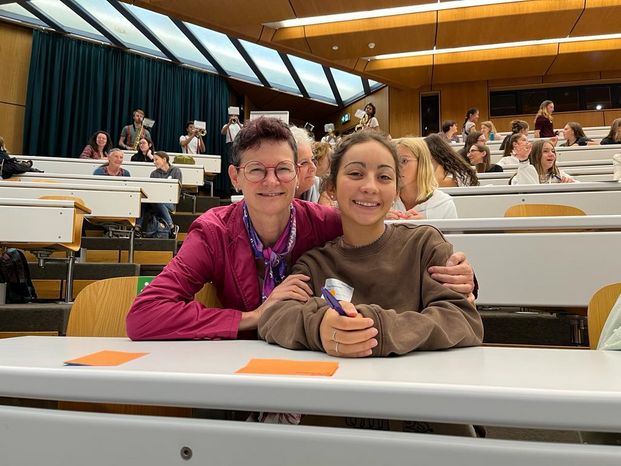
Translated with DeepL
I believe that everyone combines many roles. In my roles, I am good at organising and concentrating. If you put your head, hands and heart into your work and trust in your abilities, you can achieve a lot. However, there is usually a counterpart with whom you have to negotiate - so there is always a need for coordination and compromise. As a civil engineer, I plan my infrastructure projects analytically and rationally. This often suits my nature better than the debates in the Cantonal Council. There, it's not just about facts, but also about a lot of emotions and tactical alliances. The challenges in both spheres can only be overcome through teamwork. I draw my professional motivation from both technically successful solutions and political successes.
I was already interested in maths and science as a child and enjoyed playing logic and construction games, and my family fully supported me. I was then able to put my interests into practice during my studies. It's very creative because it requires a lot of skills, you have to be able to plan and be inventive. In fact, we all "reinvent" ourselves every day. Those who have the inventive courage to develop themselves further usually also see new opportunities. This has inspired me for almost 40 years.
Unfortunately, some people still believe that studying engineering is very difficult or that women don't understand numbers - the opposite is true. Sure, the course requires a lot of physics and maths, but I think studying medicine is much more difficult - and there have been more women in that field for a long time already.
During my studies at ETH Zurich, we female civil engineers were "exotic", or as they say in Italian "mosche bianche", meaning "white flies", something very rare. Today I would say we were pioneers. While currently around 15 per cent of civil engineering students are women, back then we were two to three per cent at most. Of course, we "exotic" women were quite admired by our male colleagues ... But we didn't get any perks or benefits and I always felt fully accepted.
Today, computers are widespread, complexity is greater and communication is more complex. We can do more in the same amount of time, partly thanks to artificial intelligence - AI - but that also worries me. AI is not really "intelligent" but adopts prejudices from the internet. Searches for "engineer" almost always show the stereotypical white male... which sabotages our efforts to attract women as technical professionals. Fortunately, there are many new technical degree programmes (that don't exactly look like this), such as environmental engineering or landscape architecture, that have a more attractive image for women.
Gender balance has not yet been achieved among civil engineers. However, gender balance does not necessarily have to be a 50:50 ratio. When one third are women, their presence begins to be seen as normal. I believe that true equality will be achieved when women with normal abilities, i.e. without exceptional abilities, also manage to reach top positions in all areas.
Fortunately, working mothers are no longer a rarity. But balancing private and professional life is still easier for men. In my opinion, this changed slightly during the Covid period, when everyone had to work from home. The men I know have mostly taken on more housework and care work.
Many men - and perhaps also many women - still believe that a woman has to be better than a man in order to be accepted and that she can't afford to make any mistakes. I also see this in politics: a woman is hardly forgiven if she slips up, whereas men are more likely to get back on their feet thanks to their established circles. It is obvious that both in public and and in private, both genders are needed to master the future.
Role models from science and technology are very well suited to inspire young women to pursue a STEM career. But these role models today have to be approachable, normal people. My role model back then, as a girl, was Marie Curie - an extraordinary figure who only appeared in books... Today, it helps enormously to get to know career paths in personal conversations - such as those that take place in the Swiss TecLadies network - and to see that it is worthwhile to stand up against stereotypes and to stand up for your interests.
Swiss TecLadies is a valuable community of friendship, an additional circle alongside family, school and work, an inspiring laboratory for the future. It is fascinating to come together as a couple or in a group to talk about the future plans of our girls and mentors. These moments of connection across generations allow us to share our ideas and experiences and find common goals.
We live in a difficult world today, full of discomfort, fears, misinformation... so it's even more important for young women to meet real people who encourage and show how to get involved. We are constantly learning from each other.
Progress no longer means the same thing today as it did in the 20th century. There is no way around measures to combat climate change, save energy and to recycle infrastructure and raw materials in the sense of a circular economy. We need many more female specialists, not least committed female civil engineers, to tackle current and future challenges!